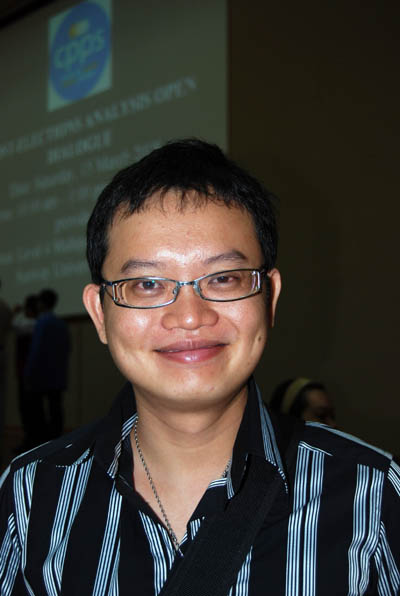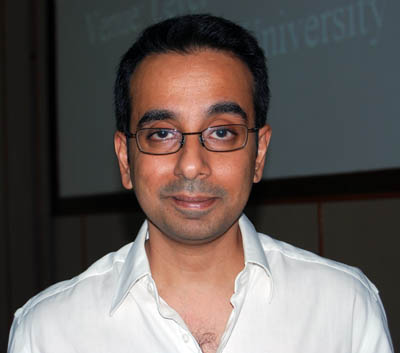By Cindy Tham
cindytham@malaysiavotes.com
![[L-R] Denison Jayasooria, Zainon Ahmad, Khoo Kay Peng, Ramon Navaratnam, Malik Imtiaz Sarwar and Farish Noor.](https://www.malaysiavotes.com/wp-content/uploads/2008/03/speakers-1.jpg)
The speakers at the CPPS dialogue: [L-R] Denison Jayasooria, Zainon Ahmad, Khoo Kay Peng, Ramon Navaratnam, Malik Imtiaz Sarwar and Farish Noor. Photos by Cindy Tham.
PETALING JAYA: If you think your “work” as a voter is done after you cast your ballot on March 8, and the rest is up to the political parties, think again. The process of shaping a political culture that is more democratic and more in tune with the different voices on the ground has just begun. This is true not only for the political parties but also for the electorate and civil society groups, said the speakers of a post-election analysis dialogue.
There is a need, they pointed out, for a new language to define the new political landscape that the nation has ventured into – the just concluded 12th general election which saw the Barisan Nasional (BN)’s longstanding two-thirds majority in Parliament reduced to a simple majority for the first time in decades, hence demonstrating that Malaysians are capable of changing the balance of power through the ballot box.
Voters need to continue to push for a more pluralist and accountable government, be it at the state or federal level, no matter which party is in power, said the speakers at the dialogue organised by the Centre for Public Policy Studies (CPPS) at Sunway University College on March 15. The CPPS is part of the Asian Strategy and Leadership Institute, an independent and non-partisan think tank.
As the nation grapples with the transition of having five non-BN state governments, the people need to recognise, accept and respect certain existing institutions, some of the speakers said. These include the Federal Constitution’s provision for the special position of the Malays, the role of affirmative action in helping those who are genuinely in need regardless of race, and the election as a democratic process that should not be thrown out by those calling for the resignation of BN chairman and Prime Minister Datuk Seri Abdullah Ahmad Badawi.

Political analyst Khoo Kay Peng said it was up to the Umno general assembly, to be held later this year, to decide if Datuk Seri Abdullah Ahmad Badawi should remain the party president.
One of the speakers at the dialogue, political analyst Khoo Kay Peng, said those who called for Abdullah’s resignation just because the BN had failed to retain two-thirds of the parliamentary seats, were ignoring the fact that the BN still won, albeit with a simple majority, through a democratic electoral process.
In the election, Abdullah retained his Kepala Batas seat in Penang with a majority of 11,246 votes, and the BN won 140 of the 222 parliamentary seats.
Khoo said it would be up to Umno to decide at its general assembly later in the year if Abdullah should remain the party president. He added that any change in the nation’s leadership should be done through a democratic process.
The president of Umno has traditionally been the head of the BN, which has been the ruling coalition since independence in 1957. But tradition aside, according to the constitution, it is really the Agong and the Members of Parliament who decide who should be the prime minister. Article 43 states that the prime minister, appointed by the Agong, has to be a Dewan Rakyat member and has to, according to the Agong’s judgment, command the confidence of the majority of the members of that House.
Umno Youth executive council member Datuk Mukhriz Mahathir is among those who have called for Abdullah’s resignation in light of the BN’s performance in the election. According to the New Straits Times (NST), Mukhriz had in a letter dated March 12 asked Abdullah “to do what is appropriate”. “I appeal to you to take responsibility for the defeat. Only by your resigning as prime minister and Umno president can the recovery of Umno, BN and the nation be accomplished successfully,” he wrote, echoing his father’s (Tun Dr Mahathir Mohamad) statement on March 9, the NST reported.
New language
The reminder that the democratic process of an election should not be discarded just like that, points to the need for a new language and way of thinking among Malaysians – both politicians and the people alike.
One clear example that illustrates the need for a new language is the blanket assumption that the BN is the ruling government and non-BN parties like Parti Keadilan Rakyat (PKR), the DAP and PAS are the opposition. This is no longer so in four more states other than the long-time PAS-ruled Kelantan. In Kedah, Penang, Perak and Selangor, the BN is now the opposition. So when we say the opposition these days, it could mean the BN, PAS or PKR-DAP-PAS, depending on which state we are referring to.
Historian and political scientist Dr. Farish A. Noor said the shaping of a new language would be crucial to the evolution of a more pluralist political culture in Malaysia. He said this would entail thinking beyond the traditional sacred cows or taboos. For example, would Umno, which claims to defend the interests of the Malays and bumiputeras, be open to the possibility of having a Kadazan or Iban as the president? Would PAS, which claims to have transcended race politics, accept a non-Malay Muslim as its leader?
“Malaysians have for a long time allowed the powers that be to dictate the terms of our political culture. The time has come for us to imagine what had previously been unimaginable, to think of new political possibilities,” said Farish, a senior fellow at the Rajaratnam School of International Studies at Singapore’s Nanyang Technological University.
The speakers pointed out that this political change would not be a smooth process. Indeed, the problems have already emerged less than a week after the polls in both non-BN and BN ruled states.
For example, the new Penang Chief Minister Lim Guan Eng reportedly said the DAP-PKR coalition would run the state government free of the New Economic Policy (NEP), which he said bred cronyism, corruption and systemic inefficiency. The comment has raised concern among some Malays, which prompted the DAP to clarify that Lim was misinterpreted. In a March 15 Bernama report, Lim said no one would be neglected or marginalised, and the state government would share the state’s wealth with all the people of Penang.
In Perlis, the ruler Tuanku Syed Sirajuddin Putra Jamalullail named Bintong assemblyman Datuk Dr Md Isa Sabu as the new chief minister, instead of Perlis BN chief Datuk Seri Shahidan Kassim, who had received a letter of appointment for the post from Abdullah while in Trengganu, the new chief minister has yet to be appointed.
In Perak, PKR, DAP and PAS argued over the candidates for the chief minister’s post and 10 executive councillors before coming to an agreement.
Human rights lawyer Malik Imtiaz Sarwar said that given the prevailing thinking and practices that Malaysia has had for a long time, such as the role of the NEP to eradicate poverty in particular among the Malays, politicians should articulate their positions carefully to avoid any miscommunication or misunderstanding. He said there was fear among some Malays that their interests would now be ignored by the non-BN state governments.

Human rights lawyer Malik Imtiaz Ghulam Sarwar said politicians should articulate their positions carefully to avoid any miscommunication or misunderstanding in the new political landscape.
Malik noted that there were existing institutions that should be accepted as long as they were still in place. “The constitution recognises the special position of the Malays,” he said. These constitutional provisions, he added, should be accepted as long as they remained the current provisions.
CPPS chairman Tan Sri Ramon Navaratnam said the problem with the NEP was its selective implementation. “Who can quarrel with poverty eradication for all races?” Ramon, who helped draft the NEP, asked. He said it was the NEP’s implementation, which has been used to benefit an elite group and neglected many who are genuinely in need that has made the NEP a problem.
“Some form of affirmative action that cuts across the races needs to be there to help those who really cannot compete on their own,” said Datuk Dr Denison Jayasooria, executive director of Yayasan Strategik Sosial, an MIC-linked think tank.
Check and balance
The speakers at the dialogue pointed out that voters and civil society groups now have to play an active role in keeping all the different state and federal governments on their toes. Malik said it was incumbent on voters and civil society groups to continue to push for and support pluralist positions. He said they should not allow any party to raise racial tension, which can be used as an excuse to declare a state of emergency. Politicians and the people, he added, would need to be more conscientious in framing a new language that promotes a more pluralist culture.
“There’s a lot of work to be done,” Malik said. “Revolutionaries make terrible administrators,” he said of the new non-BN state governments, adding that they should be reminded of their promises and goals should they stray off course. “I see the BN as a counterbalancing force against the PKR-DAP-PAS government if [the latter] forgets what it promised to do.”
Said Jayasooria: “Politicians are politicians, no matter what camp they are in. If there are insufficient checks and balances, the best of intentions can go wrong. Voters need to be vigilant that their vote for change is not hijacked by any party.”
CMs, DPMs and PMs: Time to go beyond the old taboos